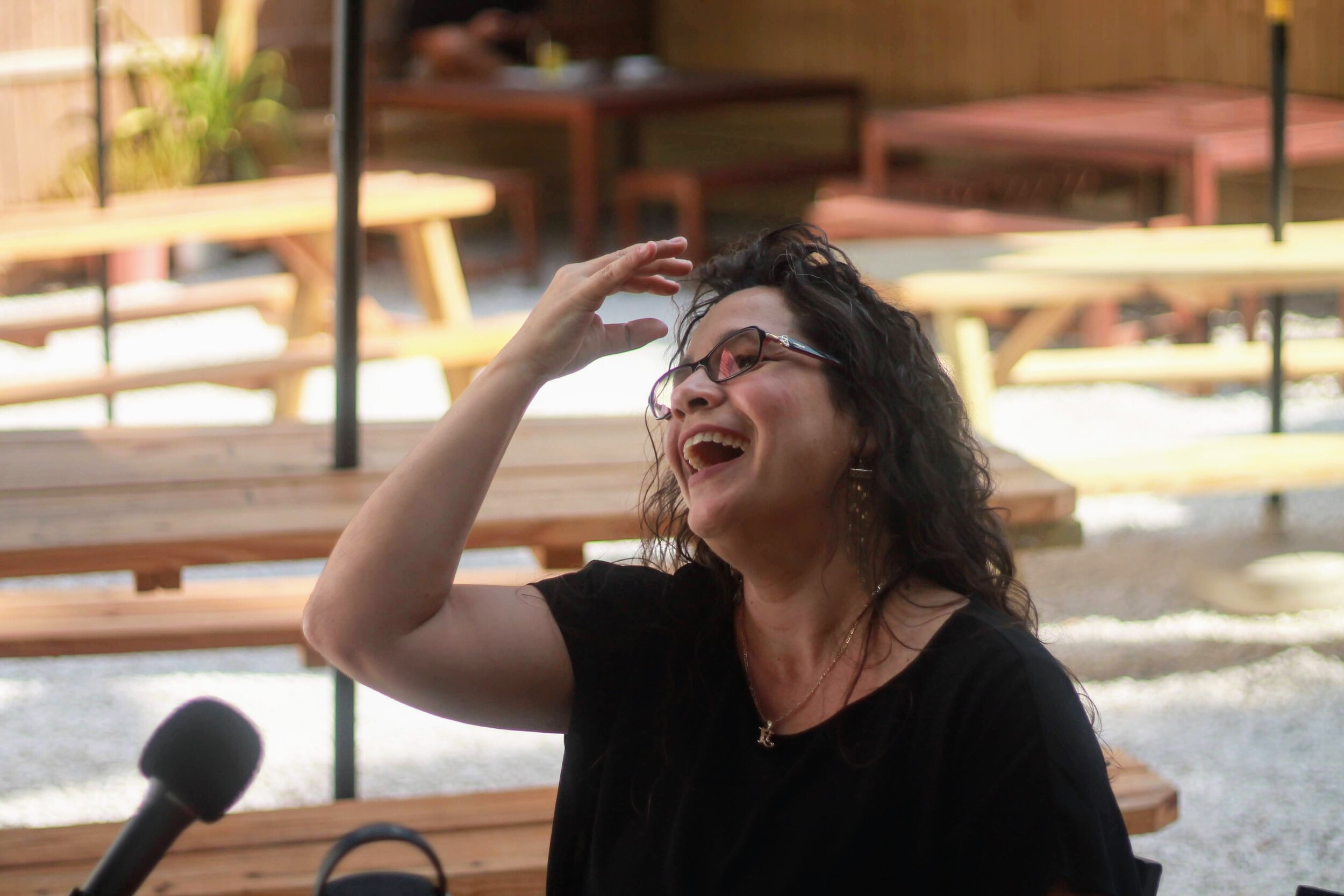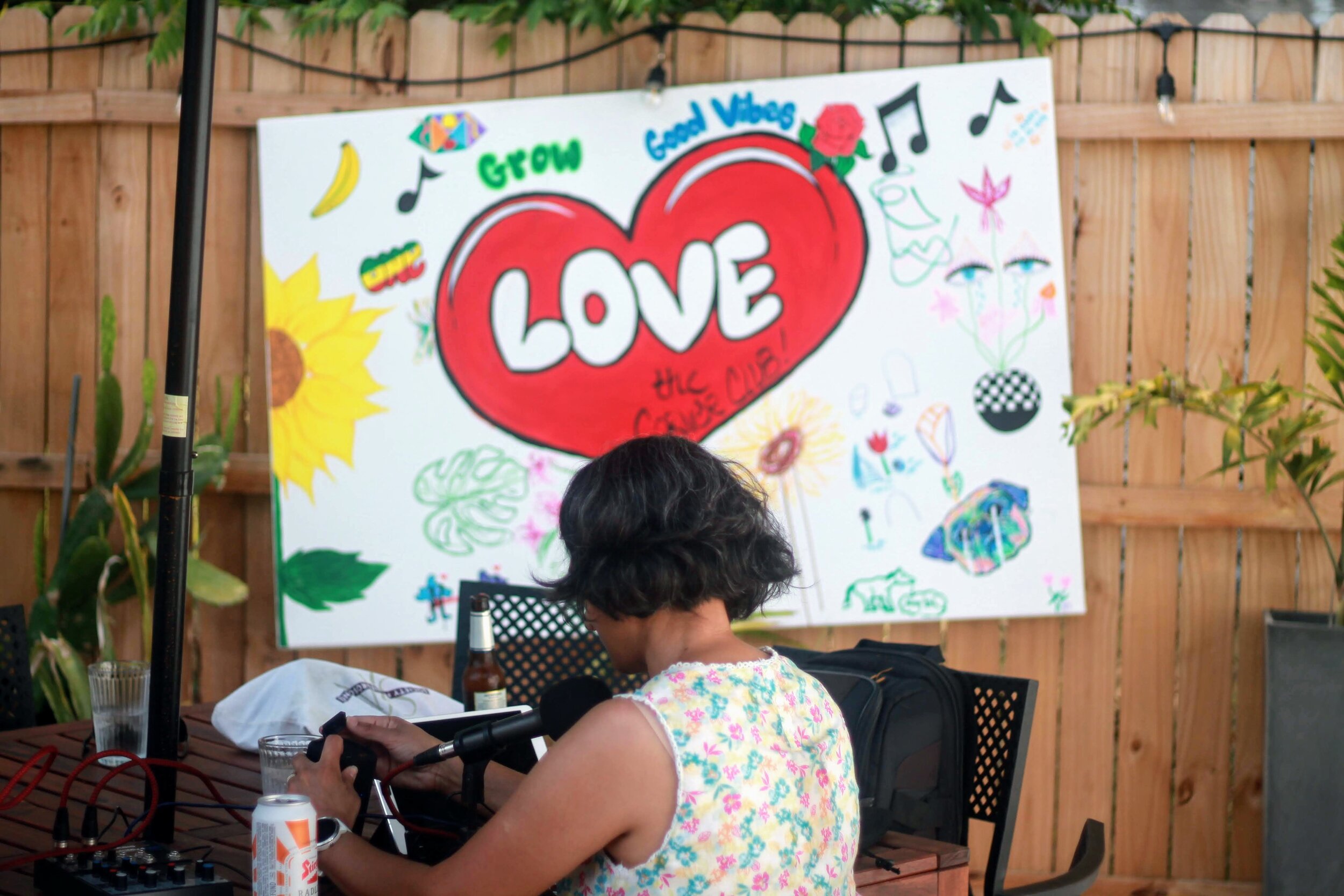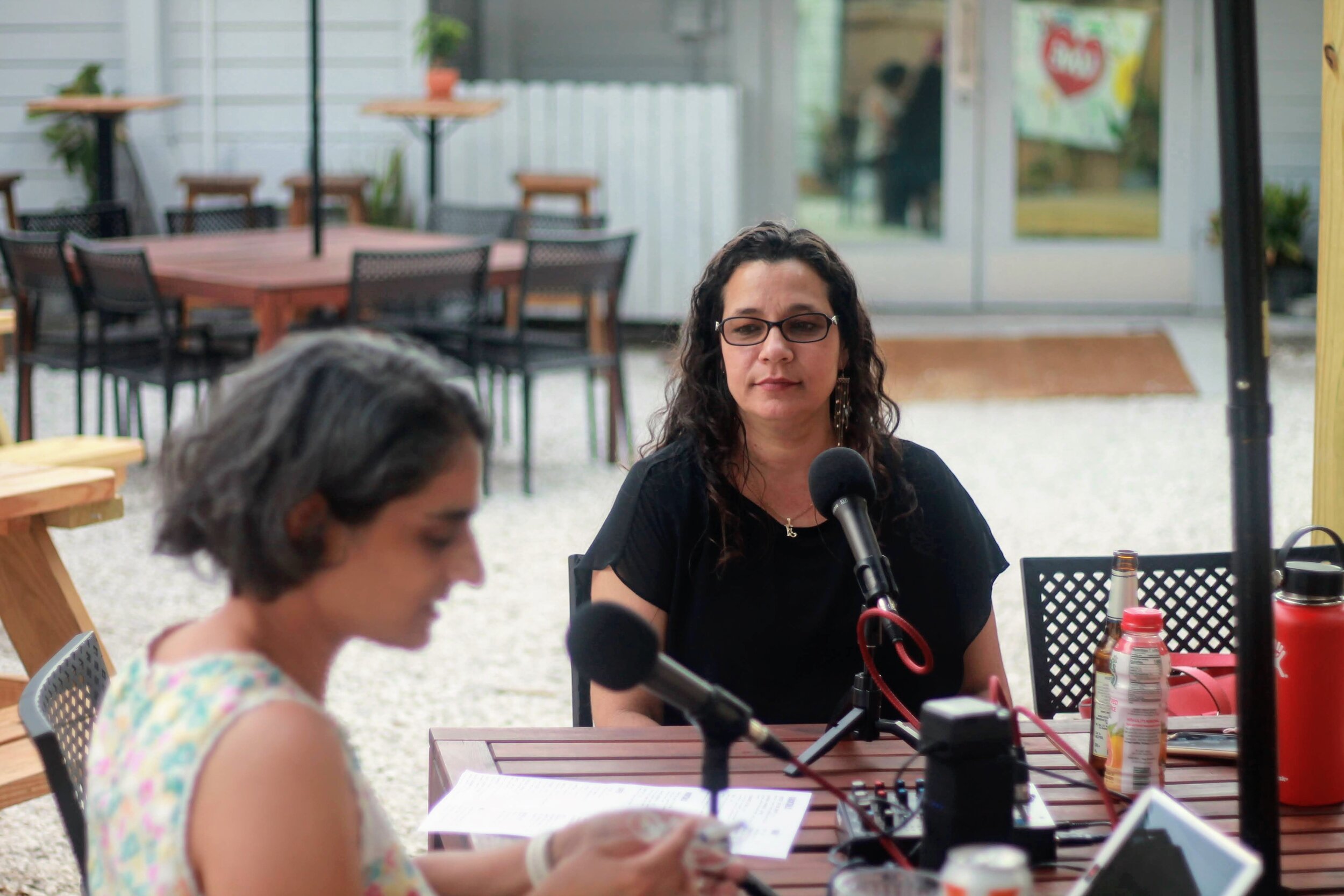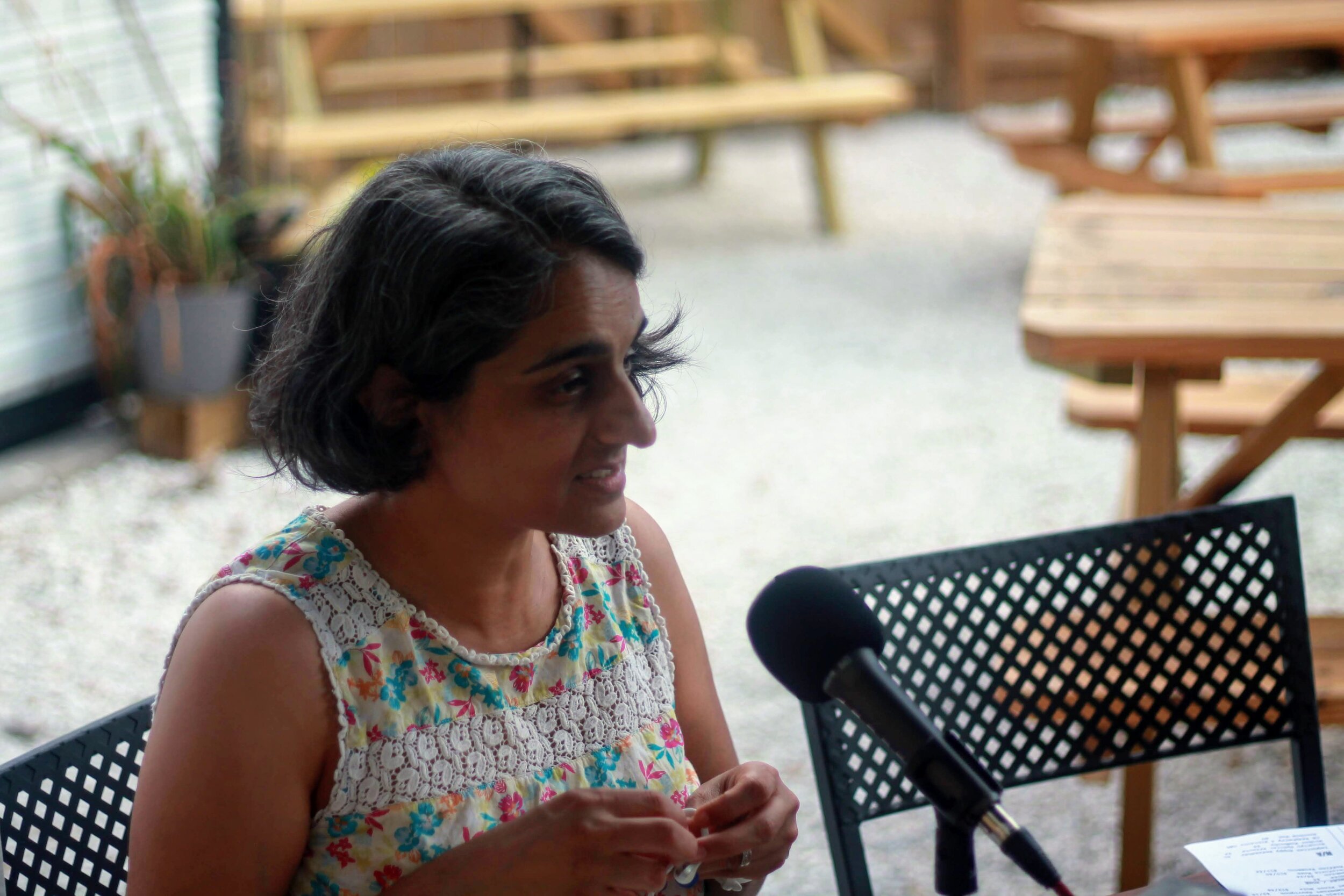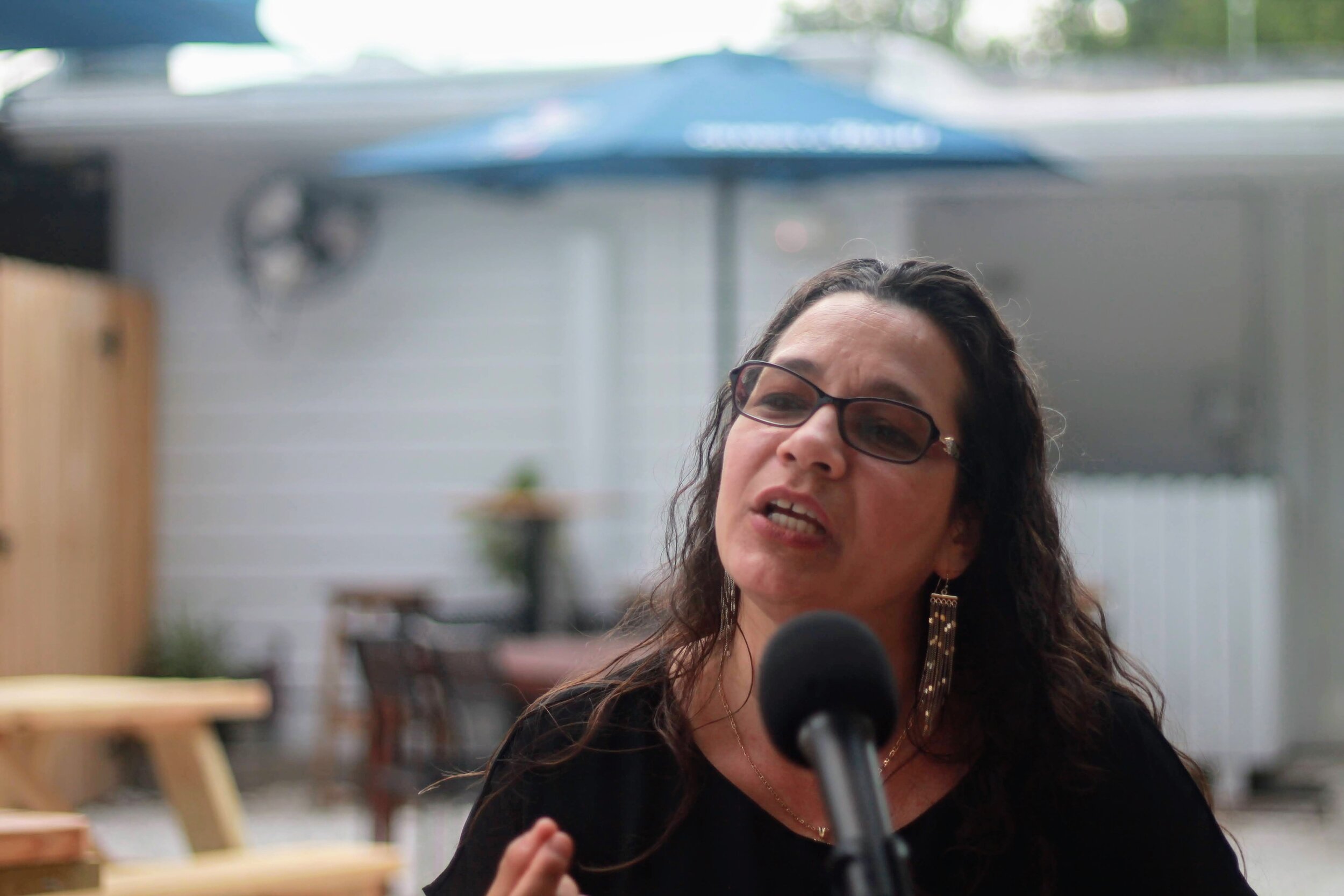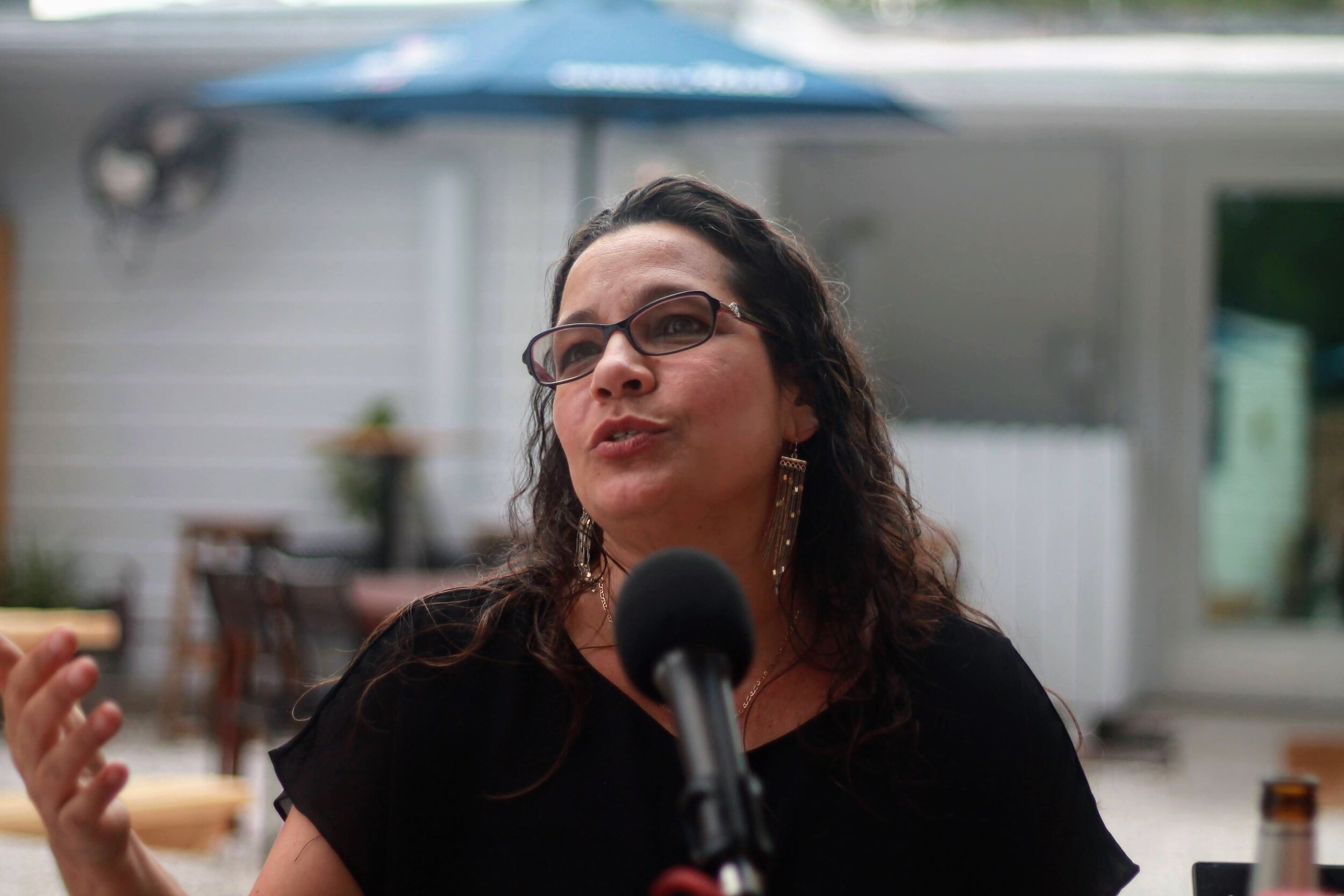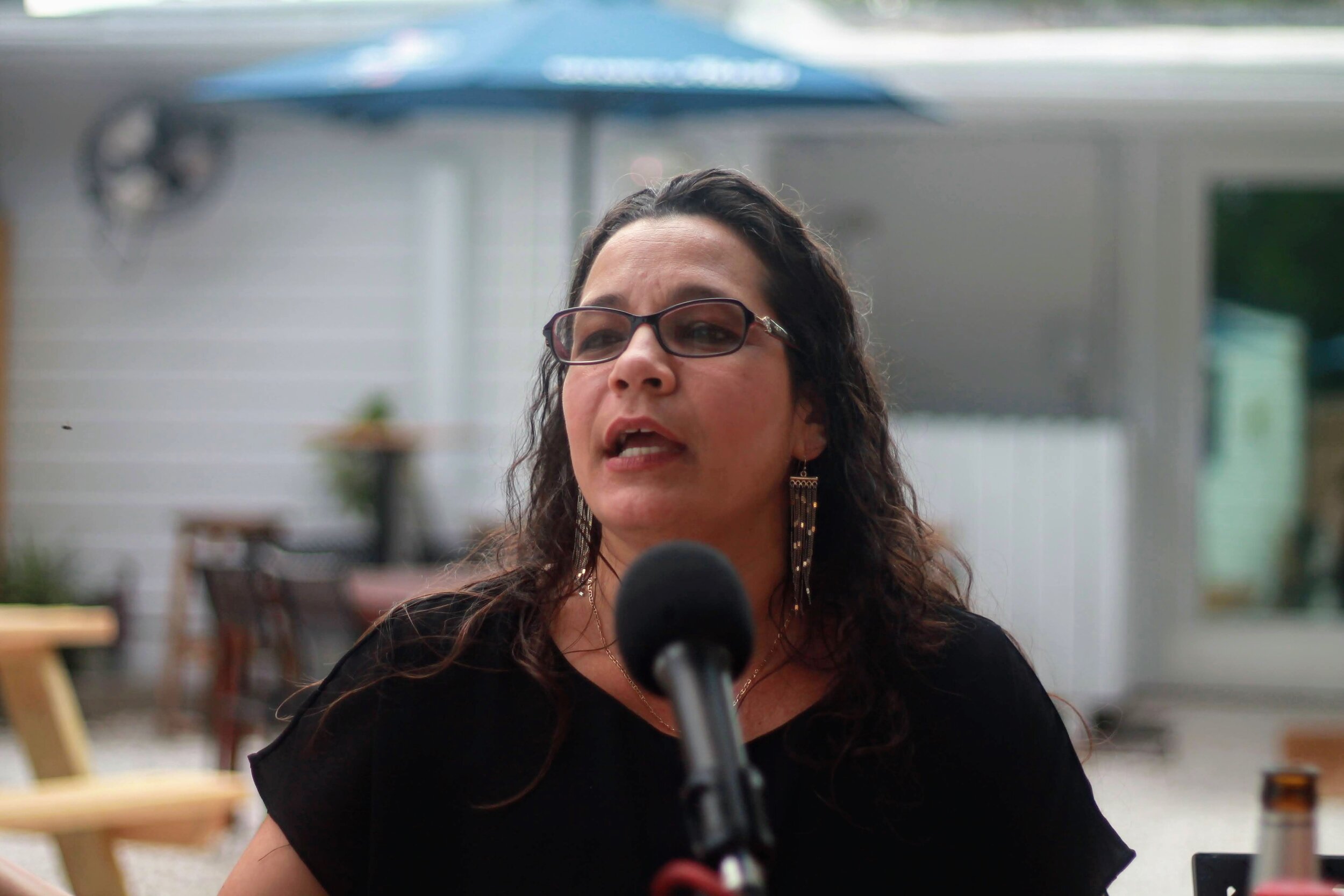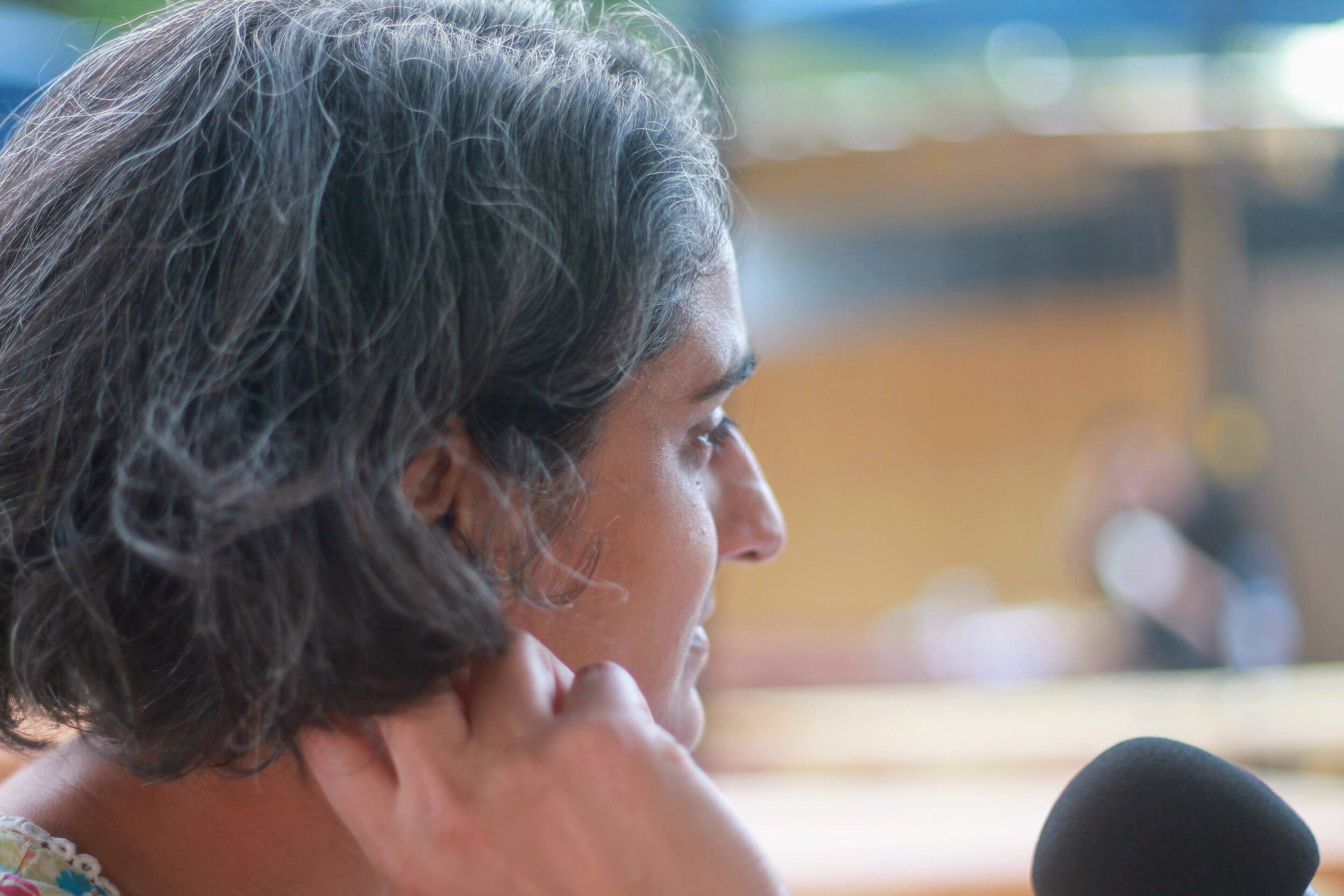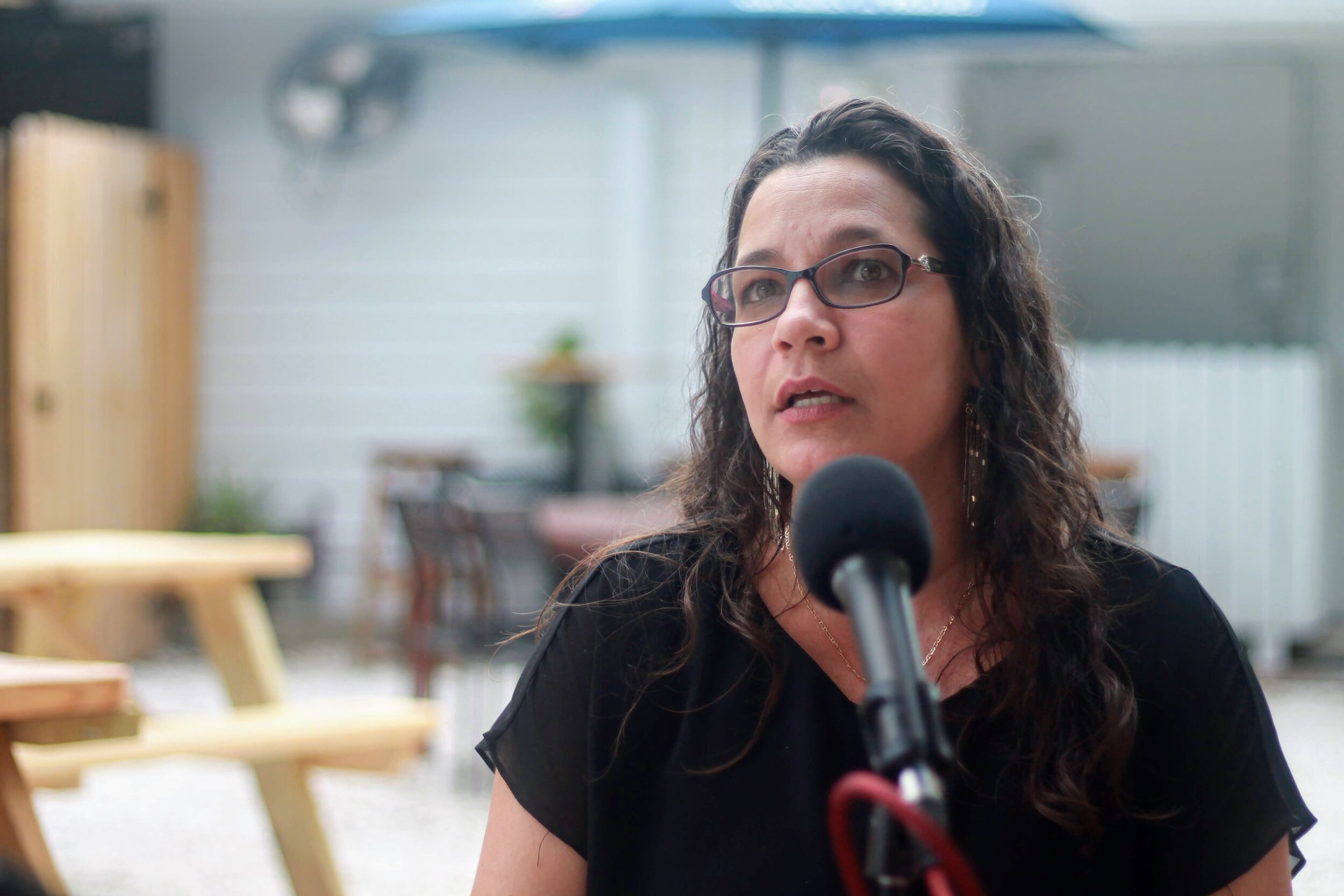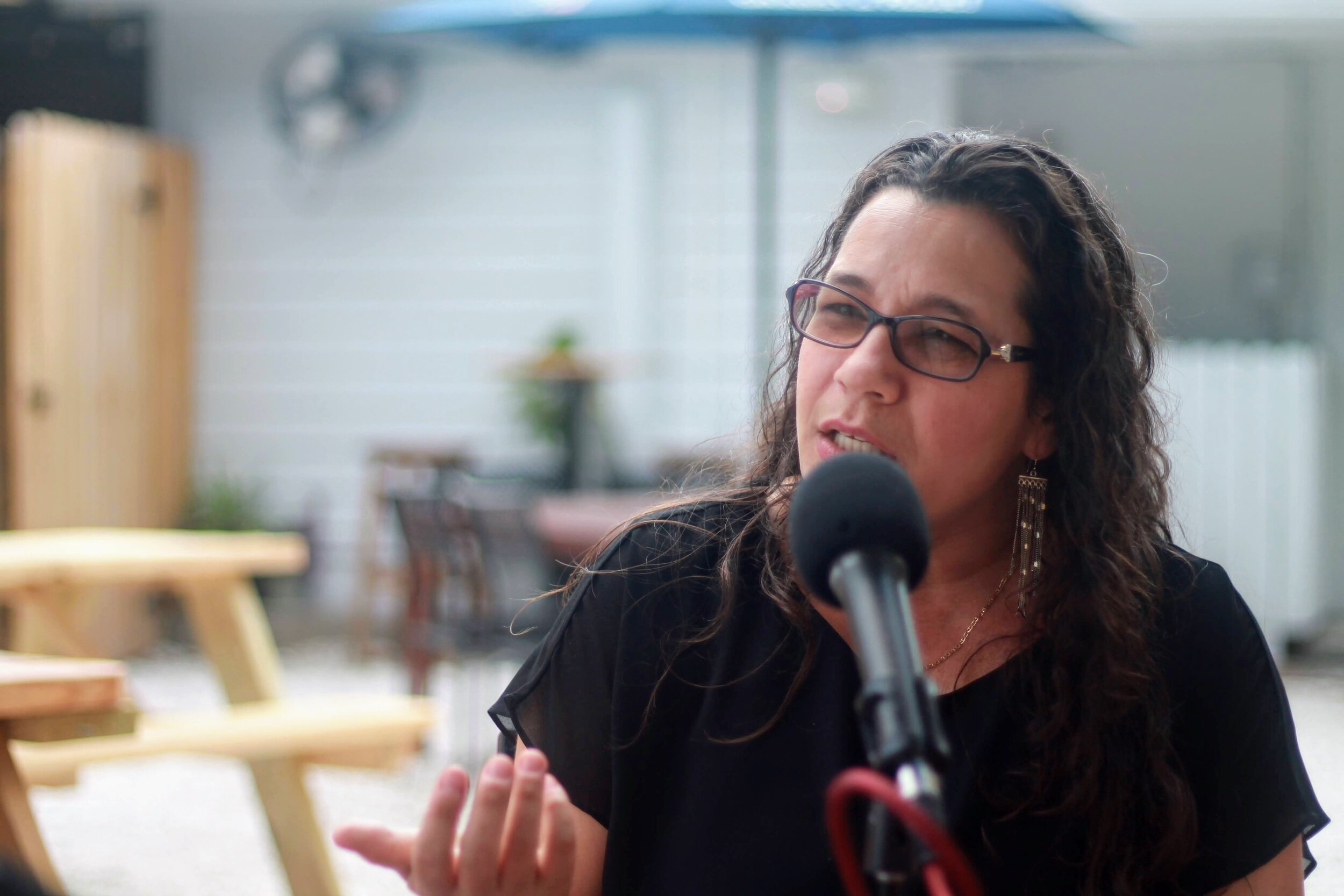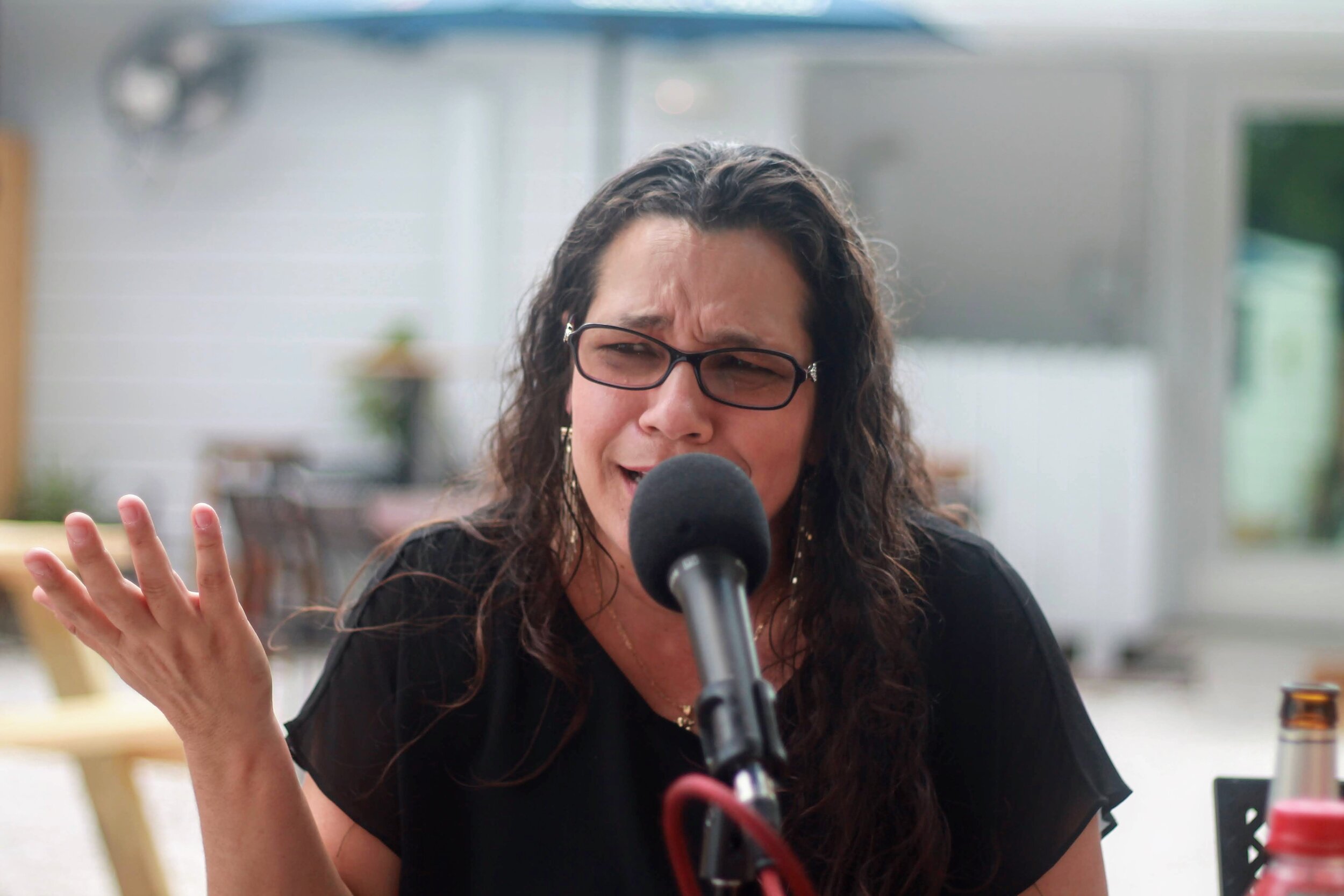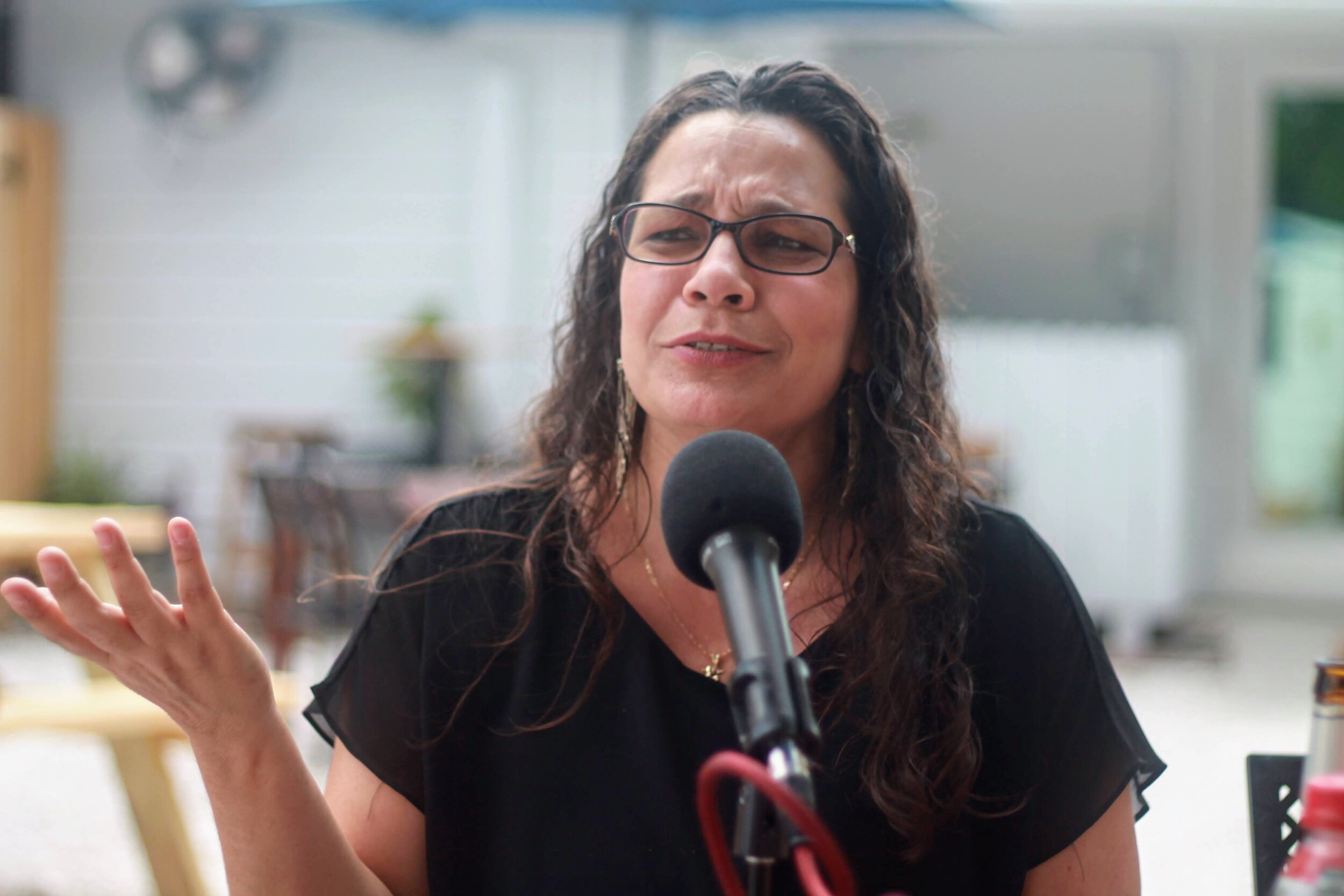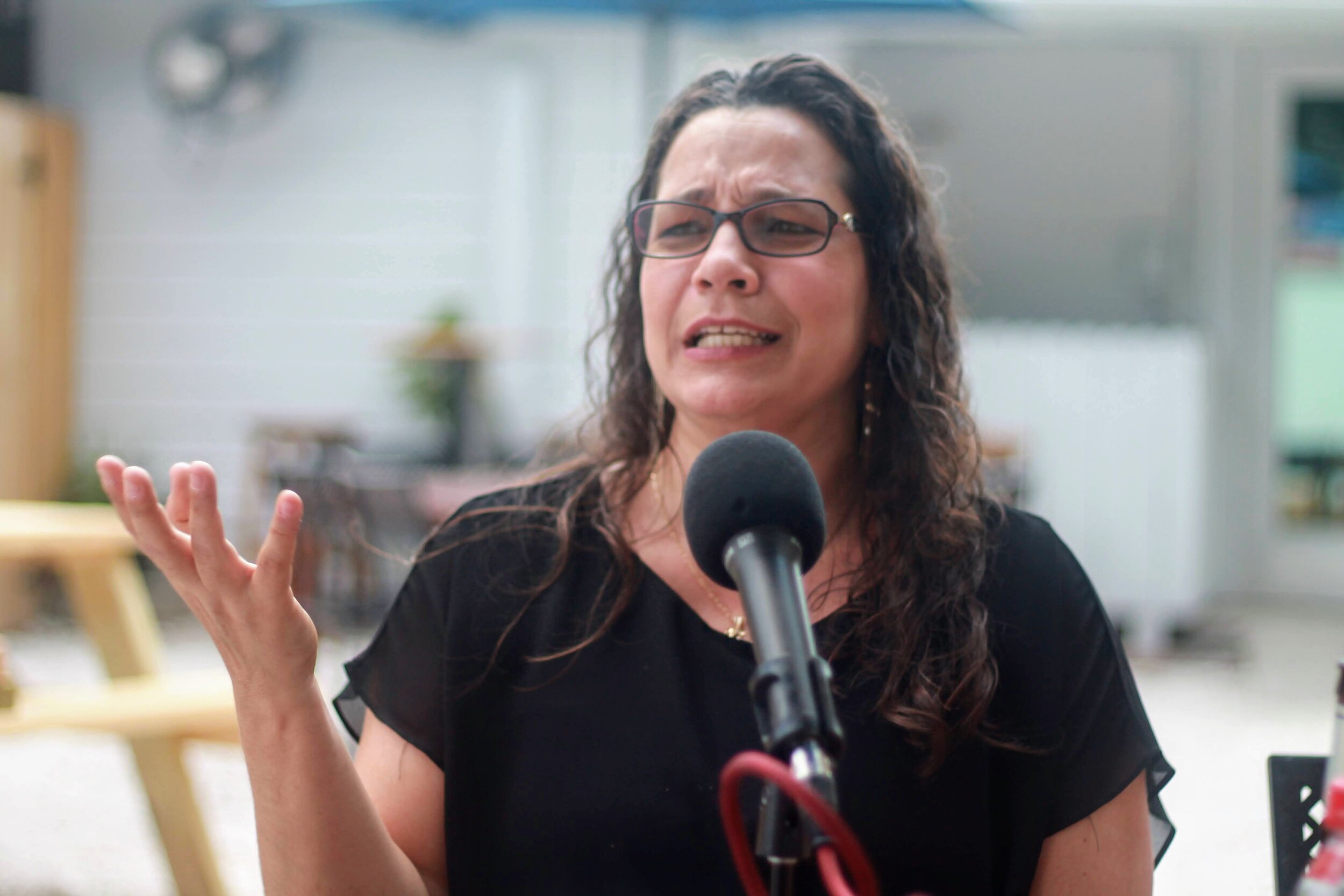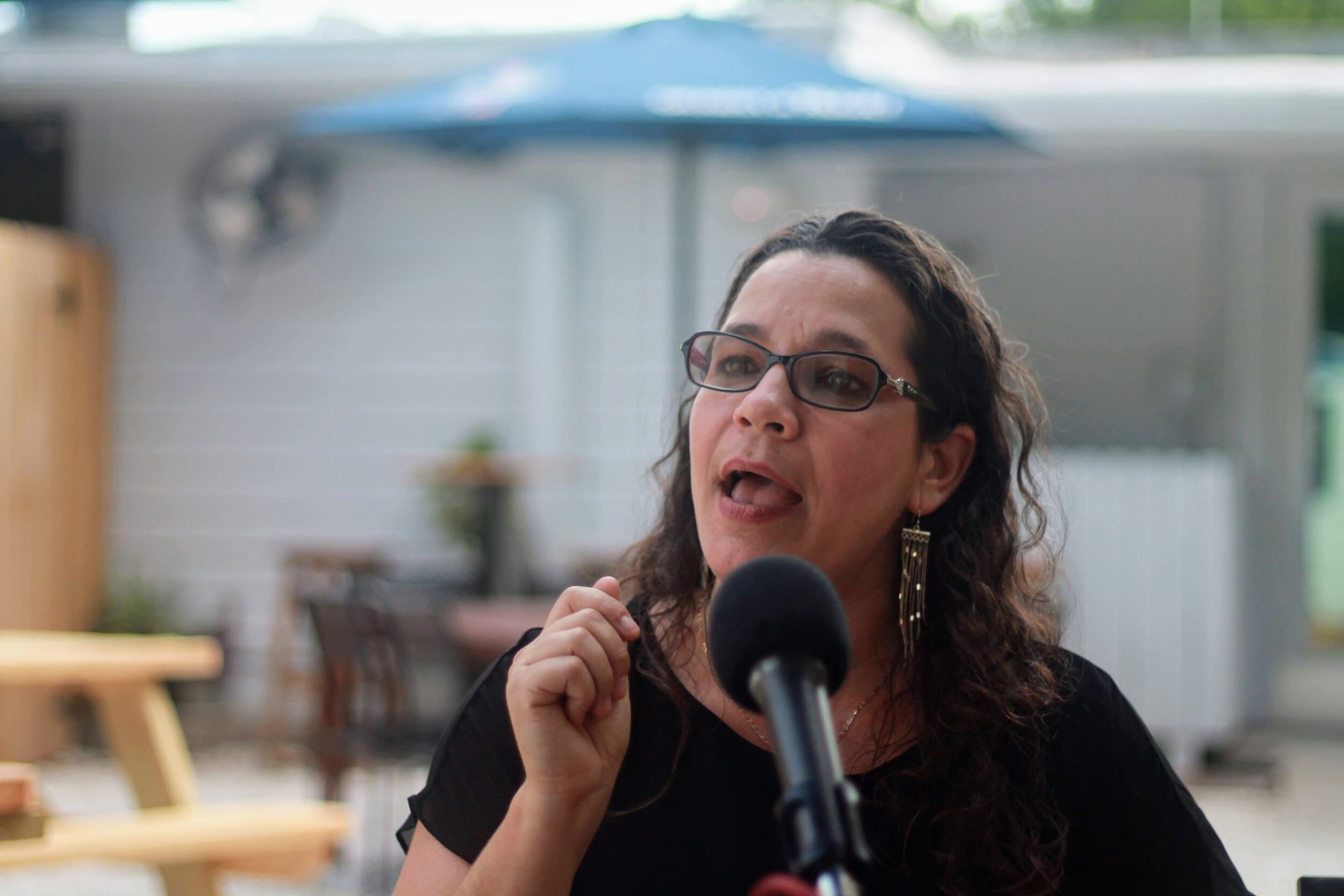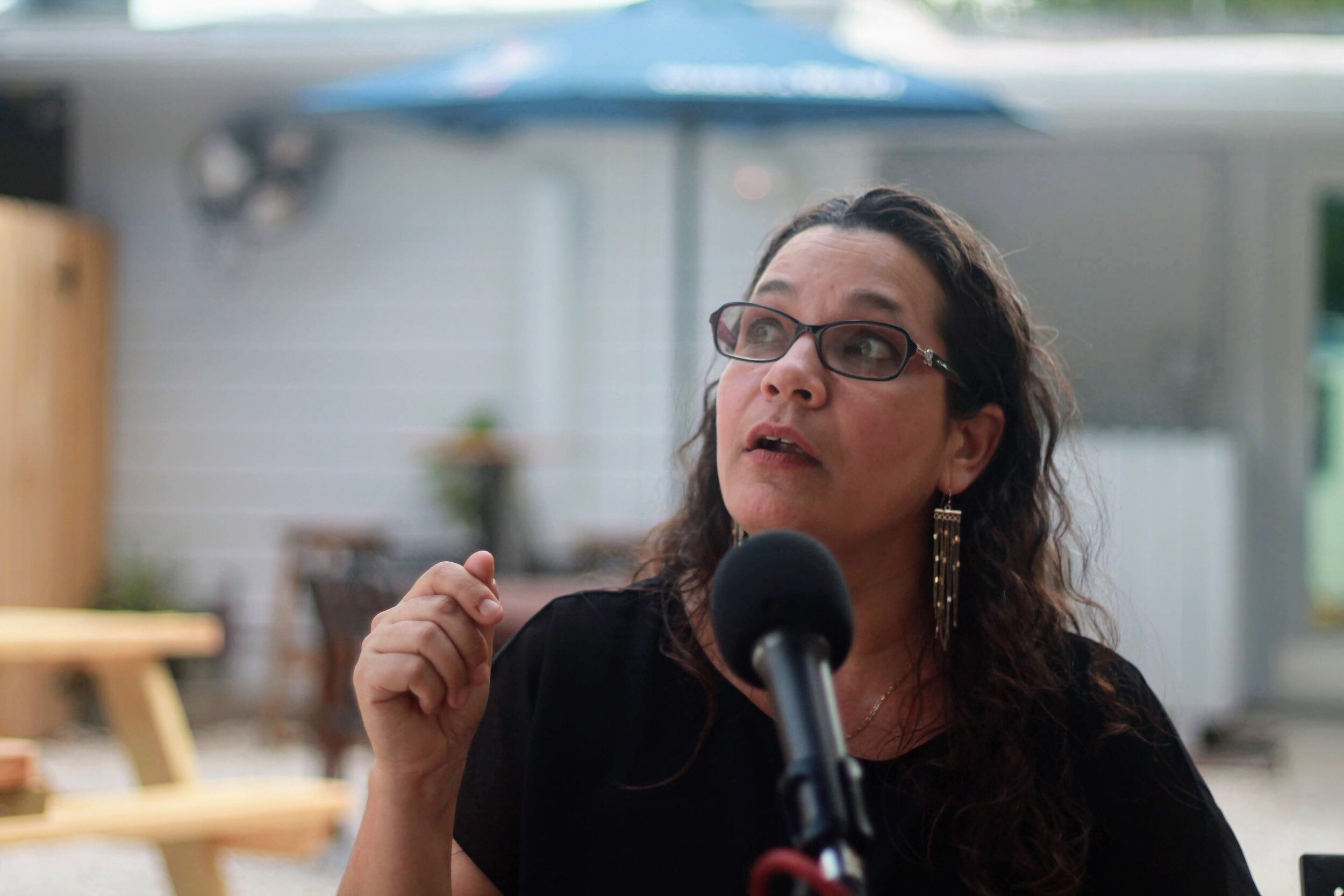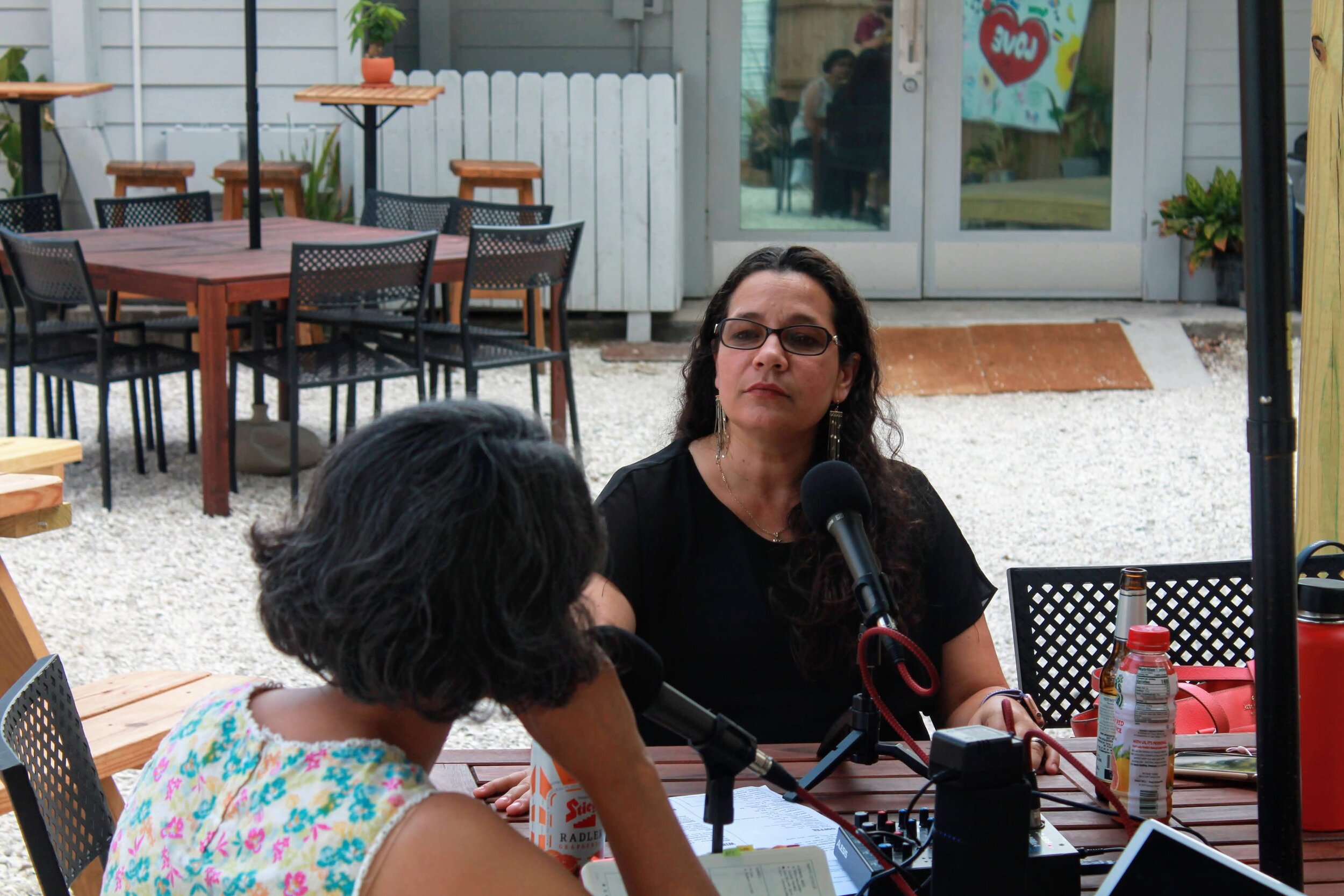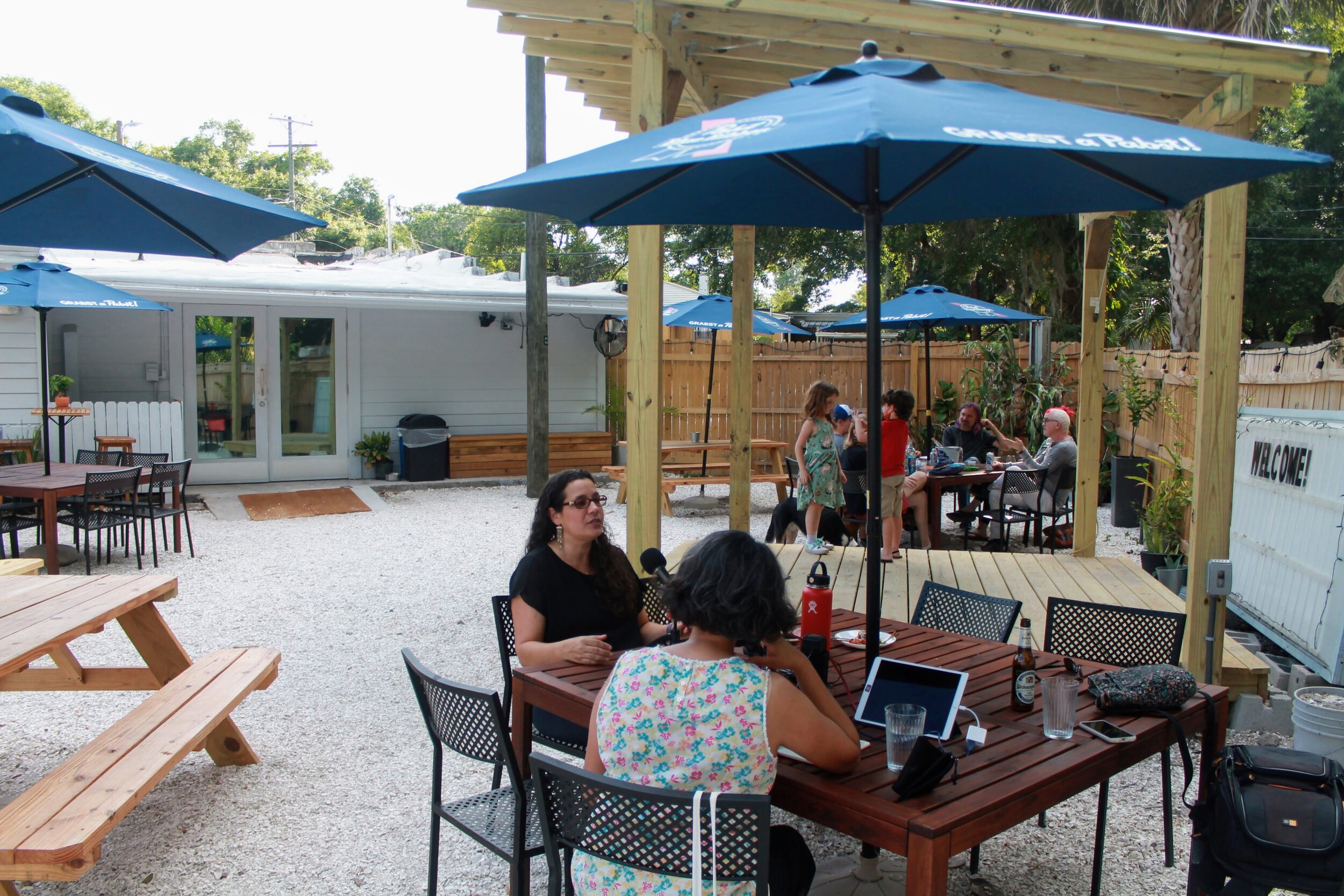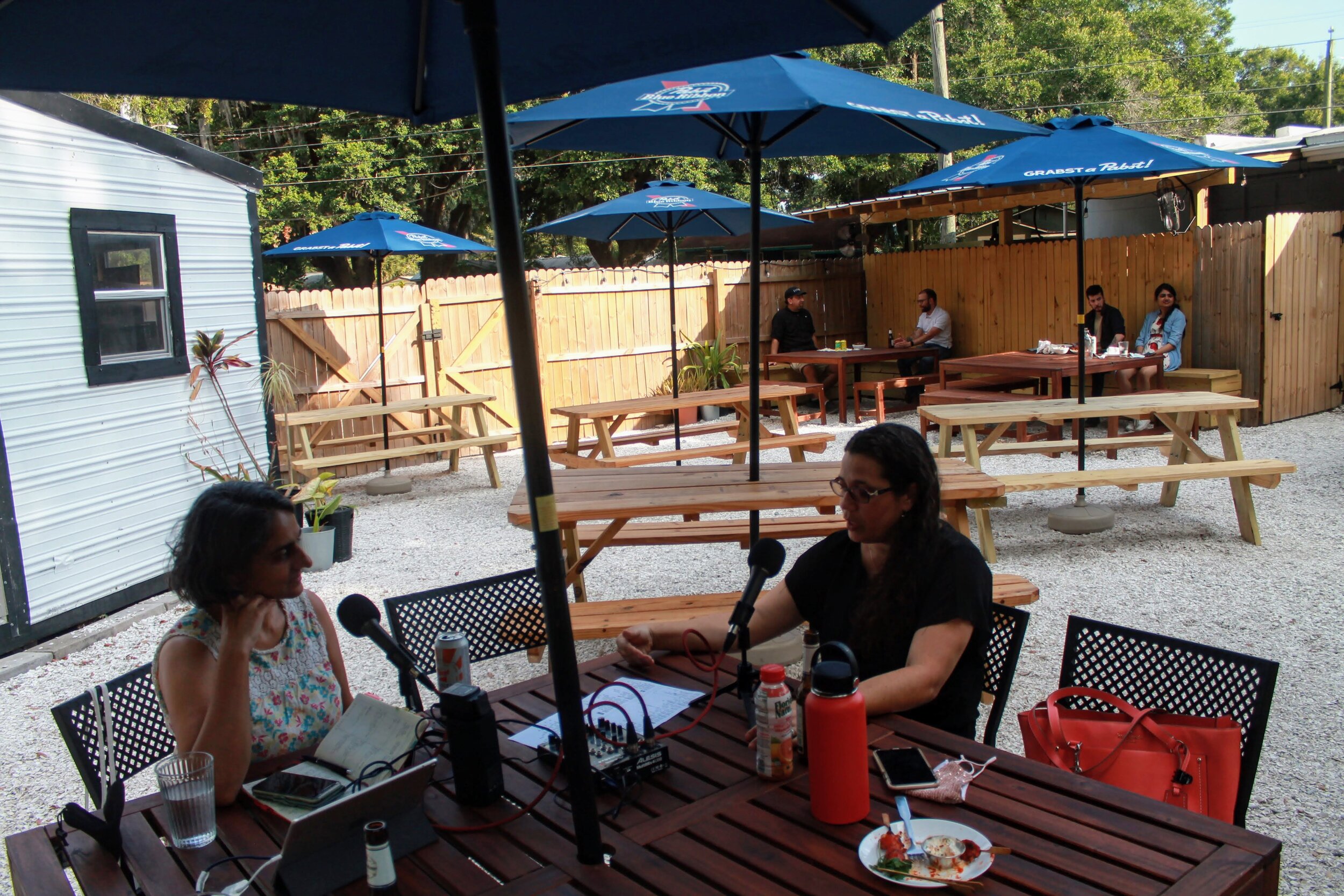Psychology, psychopathy and creating positive change
What happens when your psychology research just doesn’t quite scratch that itch any more? Well, in the case of Prof. Edelyn Verona, it means you join with your colleagues to create a Center for Justice Research and Policy, something she is well placed to do as an expert in mental health, and violent and criminal behavior.
Listen:
You can find out more about Edelyn’s work on her website or follow her on Twitter. For anyone interested in learning more about the work being done by the Center for Justice Research and Policy, check out their website and mission statement here.
Our guest artist this week is Rugawd, and you can find the featured track “Ojos” along with many others on Bandcamp. The music is generously made available for use through creative commons (CC BY-NC-SA 3.0).
Watch:
Subscribe to our YouTube channel if you’re less into the pods and more into videos.
Episode transcript
[Background intro music playing is a track called "Ojos" by Rugawd]
Parmvir: So, hello, hello everyone. Welcome back to 2scientists, the podcast where inspiring scientists share their stories with you, wherever you like to listen. I'm your host Parmvir Bahia, my partner in crime, David Basanta is here, usually snapping away with his camera and we have the pleasure of being joined today by Professor Edelyn Verona.
How are you?
Edelyn: I'm really good. How are you?
Parmvir: I am. I'm doing okay. It's getting ever so, it's getting to that limit of being too hot to be outside in Florida, but I'm sucking it up for now.
Edelyn: Yeah, it is hot.
Parmvir: So. You sent us a little intro to yourself and, uh, I wanted to introduce you to our audience. Um, I know that you are a trained clinical psychologist at the University of South Florida, and that you study a really wide range of subjects from criminal behaviors, psychopathy, substance abuse.
Um, but before you got to this point, you had quite the journey as someone whose family fled Cuba. Can you tell us about your history and, um, what inspired you to study, not just science, but the field that you heard you were in now?
Edelyn: Yeah.
Well, my. My dad was a political prisoner in Cuba. So, you know, and he, and they were like a ragtag team.
It's not like they had major, major battles with the Castro regime, but they, um, but they, I think, you know, had some weapons that they smuggled and they buried them. And then years later, one of the cousins kind of. Got snatched up and, and gave them all up. And so he spent the first six years of my life in a Cuban prison.
Um, and then in 79, when, uh, you know, Jimmy Carter. Thank him. Um, he, he had, uh, uh, you know, kind of an exchange with Castro's, a humanitarian exchange medicine to Cuba for the release of some political prisoners. And that's how I came over to this country. Um, and obviously we settled in Miami as all good Cubans do [laughing].
Um, and, um, and so. You know, we don't, I don't have any background academic background in my family at all. You know, we, uh, we came, my family comes from very rural area, Cuba it's west of, of Havana. So it's, it's called Pinar del Rio and there's a lot of farmers there and that's kind of the background my family came from.
Um, and so I'm not sure how it all kind of came together for me, but I realize. I think for me, one of the things I realized is education was one way that I can, I could do some things outside of Miami culture. Like I could get away and not that it was like that terrible, but it, I was like yearning for something different.
And so I think that I, at some point like the light bulb, you know, I'm okay at this. And if I continue. That's the way to get out, uh, and, and see the world because my mom was very protective. And so I didn't, she wouldn't have, well, she didn't agree to me leaving. Um, but that was one way I could legitimately go.
Parmvir: Yeah.
Edelyn: Yeah.
Parmvir: Yeah. So tell us where it was you studied even the kind of subjects that you studied.
Edelyn: So when I graduated from high school, I did try to go away for college, but that wasn't happening because of my mom. So I, I got a scholarship to the university of Miami until that's where I went to school and I had sort of focused on psychology, partly because I was always interested. In like what made people tick? And I had like a really good psychology teacher in high school. It's like not really very well thought out. Um, and so I pursued that path. I always kind of like, was very orderly in it, but I also then started double majoring in history, which is a big, big passion of mine that I do on this like that.
I like on the side. Um, but I ended up applying for grad school in psychology. And there wasn't all that thought out, but it ended up being like a really good choice for me, luckily. Um, and that's when I went to Florida State University for my PhD.
Parmvir: So now you are in, um, I actually forget which department you're in.
Edelyn: Psychology.
Parmvir: Psychology. That would be very logical. Wouldn't it?
[Edelyn laughs]
And I, so before I ask about your research specifically, I am going to guess that people have a lot of misconceptions about the subject of things like psychopathic behavior. So what are the most common ones that you end up feeling that you have to address?
Edelyn: Yeah. Well, I think there's a couple. One is that they have no emotions, which makes no sense, right?
Like if you had no emotions, so you couldn't survive, period. Right. It's like having no, uh, no nerve endings kind of thing. Um, so that's one of them and, um, But, you know, that there's a prototypical psychopath, which is probably very, very rare. Um, so I think that's one that they're more new, you know, the presentations much more nuanced than they are like a psycho-quote-pathic killer.
And that actually most serial killers are not psychopathic, which is an interesting piece. Um, the second piece is that they're not treatable. Or like the only thing you can do is lock them up. Yeah. And actually there's, there's growing evidence. All those are those still too little that, that you can change their behavior.
Um, and, and that you can curb some of the antisocial, the more destructive aspects of their being. And they end, they kind of burn out of it, you know, as they get older anyway. So they might still be a little egocentric and that sort of thing, but at least the things that hurt other people more explicitly kind of fade away a little.
Parmvir: Obviously I framed this as other people, but I have the same misconceptions and kind of like [both laughing].
It's, it's hard to escape the stereotypes that you see on TV, right?
Edelyn: Yes. Yes. And that's, and you know, often, sometimes people in our field perpetuate it. And partly, it's not their fault because I think when they do interviews or are involved in a lot of true crime shows, the questions sort of lead to more simplistic kind of explanations for things.
And, and somebody being psychopathic is an easier way to explain some horrific acts than explaining like, you know, sort of the banality of evil sort of thing, you know, of that. Sometimes it, it looks just like us and has a history just like us.
Parmvir: Yeah. It's and I think that's something that's really important to touch on the idea that this is, this is something that's other, it's easy to separate yourself from something if it's like, oh, well this is not like me. Um, and so then I can categorize this person as just being evil and be done with it.
Edelyn: Right. And it, that kind of viewpoint sort of misses the fact that violent crime and murder happens amongst people that know each other and sometimes love each other or whatever that might mean.
Parmvir: So, so, um, as I mentioned at the beginning, like you, you study a whole host of things, like not just psychopathic behavior, but, um, how is it that you, well, how does your group find time to study so many quite different fields?
Edelyn: Yeah. Well, part of the, part of what we focus on is a concept called externalizing.
So the idea is that these behaviors that I study tend to come in groups, right? Yeah. So the folks that are engaging in maybe substance use are also the folks that might be vulnerable to aggressive actions under stress or whatever. These things. We think of it as, uh, you know, when I'm thinking of myself in sort of personality, psychopathology researcher terms, I'm thinking there's an underlying vulnerability.
Whether that's a combination of genetic and environmental factors that come together that put a person at risk of engaging in behaviors that are sort of disinhibitory in nature. Right. And the manifestation of that behavior can differ depending on the context, depending on, on sort of other exposures and that they've had in their life.
So for example, somebody with an externalizing vulnerability may be there. They're highly reactive plus, um, you know, impulsive or sensation seeking if they have a, uh, if they're exposed to substance use early on, maybe through, um, through friends or whatever, that might be the route that they take. And that might be why they've they then develop addiction problems, right.
Where somebody else that has exposed more to violence might manifest it that way.
Parmvir: Yeah. So this is. A nomenclature thing before we move on and David shed something that comes up a lot, a lot. I think when we're talking about this subject, what is the difference between a psychopath or sociopath?
Edelyn: So those are terms that were used prior, used decades ago to try to differentiate the etiology or the causal factors that are associated with these behaviors. So there was a line of thought that, uh, you know, there's those that are made. So through child abuse or socio-environmental adversity, and then those who are born and that's the psychopath.
And actually if you go to the original DSM or Diagnostic and Statistical Manual of Mental Disorders, DSM one, which was around the fifties or sixties, they actually had those two designations because the original DSM focused a lot of the categorization on etiology, because a lot of it was psychodynamic and psychodynamic sort of thinking was, you know, you categorize things based on sort of the conflict.
You know, the, the causes, the internal struggle, conflicts that lead to the behavior. And so that was one thing that they did, um, then that sort of, uh, once we kind of realized, Hey, it's a combination of genetic and environmental factors that sort of went away and what you have more now is the term psychopath.
Yeah, but because the psychopath was very hard to, um, to assess in a quick and dirty way because it, a lot of it involved like the ways that they are their interpersonal characteristics, um, when they moved to categorizing disorders in a more reliable way, they took out a lot of interpersonal personality stuff and kept just the behaviors. Right? So then you only have things that characterize it by, uh, uh, criminal behavior aggression, impulsive, that kind of thing that started becoming called the anti-social personality disorder.
Parmvir: Right.
Edelyn: And that's what the term that's now in the current DSM to categorize people, basically people prone to criminal behavior and impulsive behaviors.
Um, so psychopathy itself is not in our DSM, but it is. Considered separate from antisocial personality disorder and it's assessed differently.
Parmvir: Okay. Yeah. Can you just define the word etiology for us before we go on?
Edelyn: Yeah, just causal factors, kind of like where, where it stems from.
Parmvir: So, well, one of the reasons this comes up is, I don't know if you've watched the TV show Sherlock?
Edelyn: A little bit.
Parmvir: Yeah. So I think in one of the first episodes he, people claim he's a psychopath and he says, I'm not a psychopath, I'm a highly functioning sociopath. And I think that's one of those things that triggered for a lot of people: what's the difference? Okay. I guess now we know.
Um, so what was it that drew you to this work?
Edelyn: Yeah, it's interesting. Um, uh, partly interest. And partly serendipity. So the interest piece was I was more interested in aggression and violence in particular, and actually not psychopathic type violence, which tends to be a little bit, characterized as more cold and dispassionate, I was actually more interested in the hot, like angry aggression hostility was something that I was more familiar with in my family background.
And that was sort of every day, like it wasn't physical, but it wasn't, there was a lot of verbal hostility. And so that's what I was interested in. And actually my dissertation was on. More threat, relevant aggression, like why we respond when we're sort of in a negative emotional state. What, what drives that?
Um, and then I started, so when I got to grad school, I started working with a woman, Joyce Carbonell, who was doing a research study on women in prison. And, um, and so I started working on that level, like that female aggression. Female forms of criminality, what manifestations it takes, especially during the nineties, it was a time when rates of female incarceration just started to shoot up.
Um, which is still the case that there's, you know, kind of men are sort of stable in terms of incarceration rates, but women are continuing to increase. Um, and then I switched over having that background. I switched over to another mentor. Chris, Patrick who is a big psychopathy, still is a big psychopathy researcher.
And that's where I started doing more biological, like sort of looking at the biological underpinnings of it. Um, did a lot of psychophysiology to try to understand etiology, right? Because again, when I was younger, I thought etiology equals biology. Right. It was sort of that mindset that, okay, if it's biological, then you know, that's where it came.
Yeah. Uh, so we started doing a lot more research on that and that's when it brought together sort of this interest in aggression and violence and in emotion, that was the big thing. Cause I was really interested in emotion and how that drives people to behave, sort of like, um, both mood dependent behavior, like when you're feeling a certain way. You know, you just kind of act on that emotion and sort of seeing, instead of seeing the emotion is just like, okay, that's one thing that's about me. It doesn't have to, it doesn't have to define my behavior. Um, that was interesting to me, but then I was able to look at emotion at its, you know, in both, uh, both polarities, right?
So in the psychopath there's like this deficient emotionality, like, uh, You know, sort of their, their behaviors are driven by, uh, you know, kind of lack of mindfulness of their emotions and those of others. Right? Yeah. And then you had the other side, which were those who, those folks who were more reactive and they were driven by their emotions and the outcomes were similar.
Right. So they. Both ends of the spectrum kind of ended up engaging in criminal or violent behaviors, but through different means. And that, that's what I became really interested in trying to understand.
Parmvir: Yeah. So you've, you've touched on this already, but, um, you use a lot of different techniques and you, you also mentioned the fact that, you know, biology is not necessarily the same as etiology.
Can you explain the kind of techniques that you use to study all of these things? Because on the website, it mentions that you're interested in genetics. You're interested in neurophysiology, so how the brain works, but obviously you're also studying clinical psychology. So you you're studying people.
Edelyn: Yes. Um,
Parmvir: Can you kind of give us a, an overview of what a day in the life looks like for you?
Edelyn: Yeah. And, and one of the things I should mention is my day, the day in my life is sort of shifting as I've gotten, you know, with that same mindset where, um, at first I was really interested in the problem. Right. And in what, what is it that leads these folks to do what they do and understanding that.
And I thought that was getting in their head. Right. And whether that's by looking at, um, it's not enough to just ask them because, because a lot of times we don't have enough insight into their behaviors. So tapping into some of these more automatic physiological outputs would give us a sense of what's happening with them when they're exposed to these stimuli in the environment.
So we create analog situations in the lab. So whether they're exposed to threats, uh, through, through pictures, you know, or, uh, one thing I've done is like just exposed them to either shock or these air blasts that are really, really, um, either fearful or irritating and, and just trying to simulate.
And that way I can capture their physiological experience. So things I've looked at. Something called fear, potentiated startle, which they use a lot to study fear in animals, uh, animal models, right? Yeah. And it's really cool. Cause then animals, you know, they look at the full body response, you know, humans, we don't, we administer this sudden noise, burst through headphones. And we blink. That's a, that's a whole component of the startle response in humans. And that blink response, we pick up on that muscle activity through electrodes and are able to sort of relatively look at that potentiation. So potentiation would under certain environmental conditions like unpleasant or adversive experiences would tap into level of reactivity and defensive reactivity in particular. And so psychopathy would be associated with decreased defensive reactivity. So they're not responding to these environmental cues of aversiveness the same way. And therefore that means that they don't consider the consequences as much because punishment, their anticipation of punishment is not aversive to them as it might be to other people.
And so that's sort of the psychopathy piece of it. But again, I think there's a lot of folks who engage in aggressive and criminal behaviors, partly because more of their disinhibition. It's not, it's not that they're afraid of consequences. They just don't consider them at the moment, um, when they're confronted with sort of their emotional experience or whatever the gain is at the moment.
Um, so that's, that's sort of the work I was looking at is trying to understand in the moment what's happening for them, that may explain these habitual behaviors.
Parmvir: Yes. Out of curiosity. One of the things that obviously has happened as a result of the pandemic is that scientists have kind of switched their focus to try and get it to tie in with COVID-19.
And I know that, you know, one of the more devastating things that's happened during, um, you know, lockdowns and so on is that there's been an increase in domestic violence. And I was wondering whether this is something that you've studied or you know, of other people who have been looking into this.
Edelyn: Um, I have not studied it. Um, one of the things I know people were interested in is sort of the, the juxtaposition of what was happening on the outside. So folks, so for example, early on in the pandemic, when there was the shutdowns gun violence started to decrease quite a bit. And people were like, yay, no mass shootings. Right. And then there's was this concern about what was happening indoors, because now you're stuck with potentially an abusive partner. Um, and I know there's some work that's being done on this, but interestingly, we are now we have been collecting some data, some archival data on that. So we've been coding, um, gun violence incidents, according to whether they're domestic or not. And so we're hoping to be able to get some of that information.
The other thing that people don't talk enough about, about what was devastating about COVID is all the inmates and prisoners been affected by it. And that's an area of not the COVID piece, but you know, that's an, a sample that I've worked with quite a bit is correctional samples, inmate samples.
Initially it was again, because these were, these were the folks that were engaging in the behaviors I was most interested in, but more recently it's become kind of an interest, um, as part of, as I've moved more to trying to actually change the world, uh, or, you know, and so I'm, I'm less interested now in the problem, but more in terms of the solutions and that I don't need to understand the problem to help in, uh, generating some solutions to some of the issues we have with the criminal justice system and how people kind of get, get out of that cycle.
Parmvir: So this is the absolute perfect segue into my next question, which is, you know, the, in the past year or so. And you know, we are essentially at the one year anniversary of George Floyd's death, unfortunately. The, you know, social justice and highlighting police brutality. And as you say, the criminal justice system has come to the fore. Um, and you are now the director for a new center, a co-director for a new center, along with Dr. Brianna Fox called the Center for Justice research and policy.
Can you tell us more about how and why it was founded?
Edelyn: Yes, it's a great, you know, it's a great story because, because it's, um, sort of through my researcher, sister, wife, Dr. Brianna Fox, and, you know, we've really, we've really become partners in this. Um, and she. You know, she kind of gave me, has given me the opportunity to shift my focus and do research that's more consistent with the values I've gained through a lot of outside advocacy and activism that I started doing a few years back and where I had this itch, like, oh, I'm not doing enough. We haven't, we haven't cured anybody. We haven't, I haven't stopped violence, you know, I haven't prevented anybody from being violent.
Like my work isn't making that impact. And honestly, a lot of psychopathology research isn't, isn't doing what we're supposed to be doing, which is reducing the burden of mental illness and, and the social impacts. So she gave me this opportunity. There's this criminologist and she's not only a criminologist, but she's working in the field.
Parmvir: Yeah.
Edelyn: And she does really hard work. Implementing evidence-based practices in settings where they're not always super interested doing so. Um, and so through my collaboration with her, we realized, you know, we have a common goal which is to affect positive change, um, in the criminal justice system. So why not bring together not only our expertise, but bring together so many different, um, scholars as well as practitioners in the criminal justice system who really want to make this change and get all tools available to us under one roof as it were, right. We're under one space. And that was sort of the goal of the center is that I'm done with just doing research for research sake, and that's okay. Right. Like we need to do that. I'm all for research for research sake, but I'm done doing it. Right. And, um, and so we said, you know, the goal of the center is not just to get grants or to get research, but to get grants and conduct research, that's going to create, that simultaneously is moving the needle towards change to make it, to make the justice system and, uh, some of the other systems that supported more equitable as well as, just using science-based methods instead of doing what we've always done and the reasons that are often irrational, or if we're going to do things for irrational reasons, then we should just be upfront about it.
Parmvir: Yeah.
Edelyn: You know, it's like, okay, we want to be punitive because that's what we want to do. Right. Yeah.
Parmvir: Um, so, I mean, can you tell us more about the people who are involved? Cause obviously you and Brianna, are both, uh, scientists, researchers, and this is for you clearly, this is now not just your research, this is your vocation.
Right. Um, but there I, I looked through who else was involved and there's a really kind of interesting group of people who are part of the center. Can you explain who they all are and essentially where they chosen? Did they, did they choose to get involved with the project?
Edelyn: Such an interesting question.
You know what Brianna and I did, it's really interesting because we actually did our homework. I know, because I was like, I was like impulsive and like, let's do this, let's do this. And I'm like, glad I'm very action-oriented. And she's like, yeah. You know, which is funny, cause I'm the older one. Right. But you can see why some of what I do is me-search right.
I tend to be like more aggressive and action oriented, but, um, we actually started talking to colleagues and people maybe we didn't know in USF and outside, about what we wanted to do and just to get their perspective, like. And what do you think of this? Or, you know, is this something, is there a need for this?
You know, and through our conversations with them, we sort of got a sense of who's really wanting the same mission. And I mean, they were the right people to ask advice from, but then we were able to see like, oh my God, this person really believes in this. And, and that's what we did. We based it, after we had these conversations and some people just gave us advice, right. They weren't interested in being, we kind of realized like, these are people that would want to do this. And they bring in some really interesting tools that we definitely don't have. And they really want to make change. Like they don't just want to get publications.
Parmvir: Yep.
Edelyn: Because we don't, you know, we can do that on our own. Yeah. And so that's how we chose those folks to invite them to be kind of our inaugural leadership team. And so that includes a, an anthropology professor, John , who is an anthropology professor, who is really interested in missing persons investigations and making those more equitable as you know, that's, you know, what, people are investigated often depends on, you know, what's getting more media attention, that sort of thing.
Um, so that's, that's an example of one that sort of like: I didn't realize anthropologist cared about the criminal justice system or that kind of thing. Um, so we have an emergency medical doctor, Jason Wilson, which I followed all the time because of COVID. Since COVID he always had his posts about like what's happening.
And I'm like, oh my God, this guy is like, my COVID guru but he's, he's actually doing work in the emergency department to curb, um, opioid overdoses, for example. And, um, he's done some work on gun violence, uh, with gun violence victims to help get them, uh, you know, kind of talk to them about sort of ways to prevent being wounded or killed in the future again. So, um, so those are some of the examples of people that we have people in public health. Uh, we have a couple of sociologists, which totally makes sense. Um, and, uh, and, uh, we have a psychologist she's in Sarasota, Manatee. She does work on jury duty. Hmm, you know, which is social psychology kind of realm, in that area.
So these are the kind of people we brought together. And then we also wanted to address different areas of the criminal justice system. So the courts yeah. Uh, policing, obviously corrections. Um, and, and, um, and one I forget . Oh, the community part. Right?
Parmvir: Right.
Edelyn: So there's a community prevention and intervention piece that's really important so outside of the justice system. That's really key.
Parmvir: Yeah. So do you have kind of a tangible goal in mind as to what kind of changes would be made or are you really just relying on the evidence to then be able to go to the police or the courts and say, you know, we have understood this to be the case. We think that this would be a good way of informing how you make your decisions in the future.
Edelyn: Yeah. It would be disingenuous of me to say, I don't have an agenda. Right. And, you know, a lot of my, sort of qualitative research colleagues would say, you know, you have to be upfront about that in conducting your research, which is not like probably how we were trained, you know, where it's like research is objective.
Parmvir: Yes. Well, that's also not completely true.
Edelyn: Exactly.
Parmvir: But let's not go there.
Edelyn: Yeah, exactly. So, um, so I do, I think there's certain areas that definitely are right for it because the evidence is already there. So the idea is can we, I think for us, for Brianna and I think it's like if we make some changes locally, implementing and evaluating some programs that we know have been sort of validated elsewhere, but I think one of the big things is implementation is not easy, right. You have to work within the context in which you work in. So something that worked in Seattle may not work here. Not because the people are not willing here, but just because the contexts are different. Um, the, you know, the politics are different, whatever.
Parmvir: Yeah.
Edelyn: So, so I think that's one of the things we want to be known in the, at least in the Tampa bay area, as the people you would want to work with if you're a practitioner. In the state's attorney's office or in, um, in policing who like, they're like, you know, we should be doing things better. Yeah. And if, if you talk to them, a lot of people are like, yeah, we want to be more efficient and we want to do what works. Yeah. And, um, and so we want to start with the changes here that are tenable and better able to evaluate.
Are those things or are those, some of these changes, um, you know, kind of viable here and are they working in the same way?
Parmvir: Yeah. Do you have examples of things that might have been implemented already?
Edelyn: So there are, um, I could tell you that in, in Hillsborough we have a great state's attorney, which is andrew Warren, right. And he, he really believes in evidence-based, um, practice in his, he's been doing some of this. So for example, um, changing the ways in which we criminalize drug charges. Um, and he's been working with the sheriff by the way, to make some of those changes.
Bail reform is the big one. I think. I don't think that we've gone as far, but that's a really important piece for us. And we're actually looking at some data now, which is totally beyond my, scope of work, right. But I'm really interested because I know some other jurisdictions that are just getting rid of bail, cash bail, and um we know that pretrial detention can have major, uh, iatrogenic effects or bad effects on people when they, they reenter because at that point, if they spend a lot of time at pretrial detention, they've already lost whatever job they had right out in the community.
We've seen women, and this is an extreme case, but we've seen women at the Pasco jail who were caught for not paying their traffic tickets, right. And then they get their license suspended.
Parmvir: Yeah.
Edelyn: So then they don't show up to court. At that point, a warrant is sent. For their arrest and then they're, then there, it's not funny, but then they get, they get pulled over, they go to the jail, they can't pay their bail, which might be $500, or their bond, sorry. They spent two weeks there.
Parmvir: Yeah.
Edelyn: At that point again, whatever job they had or if they have kids, where are their kids at that moment? So there's, there's so many reverberating effects of that peace for a very, you know, somebody who has, will have no impact on public safety, right? Yeah. But this person being out will not make your life more, you know, more risky, and so those are the kinds of things that we were very interested in impacting by showing this.
So we've, you know, other jurisdictions have shown this. And so we're trying to show it, you know, closer to their home with some data.
Parmvir: So, um, obviously research funding has to come from somewhere. David says, as [he is] someone whose research is funded by the taxpayer, mainly in the shape of the National Cancer Institutes, or the State of Florida, how was your research funded and is the center that you're working at now going to have a specific, um, source of funding?
Edelyn: Yeah. So traditionally, as a psychopathology researcher, my research has been funded by NIMH or the National institute of Mental Health, right. Although there, there isn't as much interest in some of this stuff. You know, like their interest is severe mental illness. And so a lot of times I would get from program officers, like: well, that's like a criminal justice thing, right. So as I've shift, we now have funding from National Institute of Justice.
Parmvir: Right. Okay.
Edelyn: And one of the reasons that wasn't a source I tapped into, despite what I have always studied is that they're very applied. They're interested in the sort of things where, okay you're working in these settings and you're implementing interventions or policy change and then you're evaluating them. And that's what we were able to do in this last grant is that we were able to say, Hey, we've collected some pilot data. This jail/jails really need re-entry services. Let's do it.
Parmvir: Yeah.
Edelyn: And so my background in mental health helped with that, right. Um, in pursuing that kind of work. And so I think that's the line of work we will probably, or that the funding source that we'd probably be tapping into more. Um, but there are others. So we're looking into, you know, one of the things about the center, that's going to be hard, now I think the fun is over, is sustainability, right?
Parmvir: Yes.
Edelyn: And you guys know, like how do you sustain a program? Not only a program of research, but this, and our ideas are through a lot of community engagement, so conducting trainings for law enforcement and mental health professionals, that sort of thing, bring in some money to help fund that so we're going to look, look at sponsors. We've got some sponsors like the Tampa bay sports teams have funded part of the work because they're, they have a philanthropic arm. Very interested in social justice.
Parmvir: Yeah.
Edelyn: Especially after the George Floyd murder. And so he, so that's, that's another piece. So we're, we're sort of tapping, we want this to be this hub where a lot of stuff happens.
Parmvir: Yeah.
Edelyn: Both exchange of information and with the public working collaboratively, as well as training. You know, the public as well as professionals who work in these settings and they might be mental health caseworkers, law enforcement, um, attorneys, whatever about some of this evidence-based work that's being done.
Parmvir: Yeah. And I think it's kind of important to given that we started talking about funding to explain that you know, grants, any source of funding quite often comes with strings attached, right? And according to who you go to for the money, they say, well, you can only do basic research with this money, or you can only do applied things with this money.
And by applied, we mean, they essentially want real world kind of examples of how these things work. So, I mean, it's great that you've managed to find a stream that's now appropriate. And it's, it's super interesting to see. And I was wondering actually, what the um, so for people who are listening to this podcast, like the, the event will already have passed, but, uh, on the 26th of May, there is the official opening event and the Tampa Bay Rays and the Bucs are they also going to be part of the event?
Edelyn: Yeah. Representatives from them. It's not like Tom Brady is gonna.
[Everyone laughs]
That would be kind of cool, but no. Yeah. So representatives who run some of the philanthropic aspects of it. Yeah. Yeah.
Parmvir: And this is, I guess this is another thing that didn't occur to me before is the amount of philanthropic work that sports teams do.
Edelyn: Yes. And, um, I don't know, the Miami Heat also does a lot of this. Uh, so, you know, and I think, I don't know for sure, but it think a lot of it is driven by the players and some of their interests. And, um, I don't think that they do it otherwise.
Parmvir: Yeah. Yeah.
Edelyn: I don't know, but I suspect not, not this area.
Parmvir: Yes.
Edelyn: Right.
Parmvir: Yeah. Agreed. Like it's easy to fund a kids cancer charity, for example.
Edelyn: Exactly. Exactly. This is more controversial. I mean, I remember I have, uh, my brother-in-law works for the, for the, whatever the stadium is that the Heat play in. I forgot what it's called, like something arena, but anyway, he works for the... [David suggests a name]
the what?
Parmvir: American Airlines?
Edelyn: Maybe? I don't know.
Parmvir: They also change their names so often.
Edelyn: Yeah, whatever corporation arena, [Parmvir laughs] and they, and they put a Black Lives Matter sign in front and it caused controversy, right. So, so that is a con it's a very controversial, they shouldn't be right, because it is a, bi-partisan kind of, you know, criminal justice reform is very bi-partisan. We work with law enforcement, you know, who, who are like, we don't want more people coming in through the system.
They don't see it that way. Right. And so I think that's also a misonception that they kind of get something out of like bringing people in. I mean, they do come from from a different perspective, right. And they might see people who engage in crime with less of a mental health lens than we do, but they, they want their, you know, they don't want to be overcrowded in their jails, want, you know, to have to chase after not literally, but, you know, chasing after people who are not showing up to trial or whatever.
So yeah. So in many ways, you know, I think it's, it's a very kind of like issue that people all want some solutions for.
Parmvir: Yeah.
Do you see yourself being a part of a movement of these kinds of centers to do this work elsewhere? Do you know if there are other centers doing this kind of work?
Edelyn: Yeah, there definitely are other centers who, who are, that are doing really great work.
They tend to be, um, housed within criminology or criminal justice um, departments or with only, would tend to not be sort of...
Parmvir: Scientific?
Edelyn: Well, no, they are scientific. They just aren't, um, interdisciplinary.
Parmvir: I see. Okay.
Edelyn: So, um, so, you know, I think that's one of the pieces that we want it to be, you know, kind of explore that there's multiple settings in which these activities can happen. Like I said, the emergency department, you know, it doesn't have to be in a jail, you know? Um, it can be, you know, it can be done by anthropologists. It can be done by people who have tools that we haven't tried before. Right. And so I think that's, that's what we wanted to, to try out something that involves kind of, you know, sort of innovating new solutions, right?
Parmvir: Yeah.
Edelyn: From this, uh, from the tools that are available.
Parmvir: Yeah.
So, um, one of the last questions I think we're going to have, uh, David asks, are you an optimist or a pessimist or a realist?
Edelyn: Well, I think it depends on what you're talking about. If it's about like, uh, if it's about like, whether I'm going to lose weight. No. It's been, it's like when you reach my age, my metabolism. Okay. Anyway, but in terms of, I think in terms of locally, Um, I'm very optimistic. I think that we can create the, the right types of partnerships that we can affect change. Um, so that, um, I'm very hopeful for, I think in this country we can only get better. I mean, things, um, unfortunately I really think that things are broken.
Parmvir: Yeah.
Edelyn: Um, and if we don't get better, It's going to be tragic. So.
Parmvir: Yes, quite.
Um, he also asks what kind of tree are you?
[Edelyn laughs]
Do you want to explain why he asked that?
Edelyn: Well, I said that you guys are sort of the Barbara Walters of scientific podcasts, because you tend to talk about people's personal motivation. So that's why. Yeah, and I think I would be a Gardenia bush.
Parmvir: Oh, very nice.
Edelyn: Yeah. Right?
Parmvir: Yeah.
Edelyn: I don't smell as good, but yeah, but I'm short and I, you know.
[Parmvir laughs]
Parmvir: Well on that note, um, unless you have anything else you'd like to share about the center specifically before we sign off?
Edelyn: No, but I invite, I invite folks to kind of check us out. And if you have interest in doing work, like maybe you're in the community, Or you have kind of some like cool idea you want to pursue, even if Brianna and I can't do we bring it to our leadership team or we're starting to develop some affiliates and they might want to latch on to it.
So. So, you know, kind of just reach out.
Parmvir: Yeah, for sure. We'll make sure we put a link in the notes for the show.
Edelyn: That would be great.
Thank you so much for talking with me.
Parmvir: Of course. No, we really appreciate your time. It's so generous of you to come and speak to us
Edelyn: No , and it's great work that you guys are doing.
Parmvir: Thank you. Thank you. That's very kind.
[Musical interlude]
Edelyn: Hector's our son and when he was in kindergarten and he's nine now, but when he was in kindergarten, you know, I wasn't good. Gung ho older parents, right? I'm like, I'm going to be involved in everything. And so the teacher's like, Hey, you want to do a teaching? And I'm like, yeah. And I was going to teach them about psychology and emotions, right. And so I go there and I've got like this analogy of a house. And so the top, the top floor is like the prefrontal cortex that kind of controls behavior. And the bottom is like the subcortical areas that deal with emotion, right. So I'm doing this. And then I asked for volunteers, right?
And I pick only a couple of them and then the rest start crying. [everyone starts laughing]
I'm like, obviously I skipped out on developmental psychology to know that you can't just pick a few of them they all want to be involved. So it was like all their hands shot up. Right. And then the teacher had to be like comforting each of them in turn.
And one of the people crying, one of the students crying was my son.
Parmvir: That sounds like an epic parenting fail.
Edelyn: [laughing] Yeah
[Musical outro]
Edelyn: I hate soup so much. [Parmvir cackles]
It's horrible. And my husband's from the Midwest and his family's from like Ireland, you know, whenever generations ago, and so they love to make stews and stuff. And I'm like [makes a retching sound].

